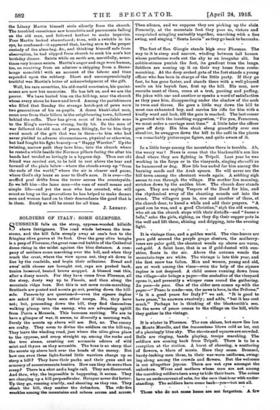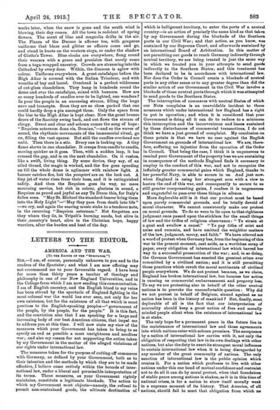SOLDIERS OF ITALY: SOME GLIMPSES. S UNSHINE falls on the steep,
cypress-wooded hillside above Sethignano. The road winds between the tree-
@terns, and the kill falls steeply away at one's feet to the fringing olive groves at its foot, Over the grey olive boughs is a peep of Florence, the great rose-red bubble of the Cathedral dome rising in the midst against the blue distance. A com- pany of soldiers come marching over the hill, and when they reach the crest, where the view opens out, they sit down in fine by the roadside, and begin their scansion°. Bread and ewes' milk cheese are brought out, caps are pushed back, tunics loosened, heated brows mopped. A blessed rest this, after a dusty march. For they hate come from Florence, all the steep, dusty way op to Fiesole, and then along the mountain ridge here. Bet this is not mere route-marching. Sentinels are posted and scouts go out, peering down the hill- side. Passers-by are questioned—even the signore legless are asked if they have seen other troops. No, they have not; but, proceeding down the hill, they find themselves walking plump into the enemy. who are advancing uphill from Ponta a Hengelo. This becomes exciting. We are to have a glimpse of war, it seems, to diversify a morning walk. Surely the scouts up above will see. But, no. The enemy are crafty. They seem to divine the soldiers an the hill-top. They leave the winding road, just where the olive gives place to the cypress, and creep straight up, among the rocks and the tree stems, crashing ant aromatic odours of wild mint and thyme as they scramble. The brae is so steep that, the swede up above look over the heads of the enemy. But bow can even these light-footed little warrior. charge op so steeps bill P They have their packs and their grins and an armoury of accoutrements besides. How can they do more than creep P There is a shot and a bugle call They are discovered. And then, why. the impossible is happening, it seems. They are charging up a hill perpendicular. Hotepur never did better. Up they go, running nimbly, and shooting as they run. They climb the hill, they scatter the defenders. The rifle-fire Grackles among the mountains and echoes ,craw and across. Then silence, and we suppose they are picking up the slain Presently, at the mountain foot they puss us, victors and vanquished mingling amicably together, marching with a fine swing, and singing " Santa Lucia" as they go back to barracks.
• The fort of San Giorgio stands high over Florence. The way to it is steep and narrow, winding between tall houses whose penthouse roofs cut the sky to an irregular alit. Its cobble-stones punish the feet, its gradient tries the longs. Soldiers are coming up it on their way home from route- marching. At the deep arched gate of the fort stands a young officer who has been in charge of the little party. If they go fast, he has gone faster, and stands there with a well-pleased smile on his boyish face, first up the hill His men, new recruits most of them, come at a trot, panting and puffing. He jokes with one and another or speaks a word of satisfaction as they pass him, disappearing under the shadow of the arch in twos and threes. He goes a little way down the bill to meet one exhausted boy, and carries his rifle for him with a kindly word and look, till the gate is reached. The last comer is greeted with the insulting suggestion, "For you, Francesco, we must order a carriage next time." A little later the officer goes off duty. His blue cloak slung gracefully over one shoulder, he swaggers down the bill to the cafe in the piazza —a remarkably picturesque figure, and quite aware of it.
In a little bongo among the mountains there is trouble. Alt the weary wart News is come that the blacksmith's son lies dead where they are fighting in Tripoli. Last year he was working in the forge or In the vineyards, singing sforselli as he hammered or dug. Now life has ended for him among the burning sands and the Arab spears. He will never see the hill town among the chestnut woods again. A sobbing sigh seems to run through the village. His mother lies moaning, stricken down by the madden blow. The church door stands open. They are saying Vespers of the Dead for him, and the rhythmical sway of the chanting sounds oat into the street. The villagers pass in, one and another of them, at the church door, to kneel a while and add their prayers. "A good eon he was, and a good Christian," sigh the old women, who sit on the church steps with their distaffs—and "hue= Bello," echo the girls, sighing, as they dip their copper pots in the well and lift them, shining and dripping, into the evening light. • • • • • • It is vintage time, and a golden world. The vine-leaves are pure gold around the purple grape elegem, the mulberry- trees are paler gold, the chestnut woods up above are warm, red-gold. A faint haze, that is as if gold-dusted with sun- shine, floats in the air. Above the autumn woods the mountain-tops are white. The vintage is late this year, and the first snow has fallen. Men and women, young and old, are at work among the vines—even the help of the signore inglese is not despised. A child comes running down from the village—she brings a paper—the contadino of the vineyard opens it, and presently a whisper rune round the gathering. La pace—le pace. One of the older men comes op with the paper—" Peace is made—see, the news is here, in the Tribuna." " la it a. good peace for Italy ?" we ask. "It is good to have peace," he answers evasively ; and adds, "but it has coat much." Perhaps he is thinking of the blacksmith's eon. So the news of peace comes to the village on the hill, while they gather in the vintage.
• • It is winter in Florence. The sun shines, but snow lies low on Monte Morello, and the irainontana blows cold as ice, out of a piercingly blue sky. The streets and squares are crowded. Bells are ringing, bands playing, troops marching. The soldiers are coming back from Tripoli. There is to he a reception at the station. A. burst of cheering, a scattering of flowers, a blare of music. Here they come. Bronzed, hardy-looking men these, in their war-worn uniforms, swing- ing along among the crowds and flowers. But the welcome is not altogether joyous. There are wet eyes amongst the onlookers. Wives and mothers whose men are not among the marching soldiers turn away to hide their team. The claws have an undereurrentof sobs, for the ears that hear with under- standing. The soldiers have come hack—yes—hut not all.
Those who do not come borne are not forgotten. A low
weeks later, when the snow is gone and the south wind is blowing, their day comes. All the town is redolent of spring flowers. The scent of lilao and magnolia drifts in the air. The Piazza of the Duomo is aflower too, with gorgeous uniforms that blaze and glitter as officers come and go, and stand in knots on the western steps, or under the shadow of Giotto's Tower. Blue cloaks are everywhere, flung round their wearers with a grace and precision that surely come from a toga-wrapped ancestry. Crowds are streaming into the Cathedral by every door. Within, the dimness is aglow with colour. Uniforms everywhere. A great catafalque before the High Altar is covered with the Italian Tricolour, and with wreaths of bay and laurel. Overhead is a perfect wilderness of cut-glass chandeliers. They hang in hundreds round the dome and over the catafalque, mixed with banners. How are so many hundreds of candles ever to be lighted, one wonders? In pour the people in an unceasing stream, filling the huge nave and transepts. Soon they are so close packed that one could hardly drop a pin amongst them. Only the space from the bier to the High Altar is kept clear. Now the great bronze doors of the Sacristy swing back, and out flows the stream of clergy. Sweet and clear and solemn comes the song of hope : "Requiem aeternam dons els, Domine,"—and so the waves of sound, the rhythmic movements of the immemorial ritual, go on, filling the vast spaces. But still the candles overhead are unlit. Then there is a stir. Every one is looking up. A tiny flame shows in one chandelier. It creeps from candle to candle, moving quicker as it goes. Then, with a sudden leap, it has crossed the gap, and is on the next chandelier. On it rushes, like a swift, living thing. By some device, they say, of an oiled thread, the magic is worked, and the fire goes speeding on till the whole dome is aglimmer with rainbow light. A banner catches fire, bat the pompieri are on the look out. A tiny jet of water rises from their hose, and it is extinguished safely. And then the Requiem goes its way, no mere mourning service, but rich in colour, glorious in sound, a Requiem as proud and joyful as any Te Deum this, for Italy's fallen sons. "May St. Michael the standard-bearer bring them into the Holy Light"—"May they pass from death into life" —we cry, and again the soaring music sinks to a tenderernote, in the recurring "Requiem aeternam." Not forgotten are they where they lie, in Tripoli'a burning sands, but alive in their .country's heart, alive in the Christian hope, happy warriors, after the burden and heat of the day.















































 Previous page
Previous page